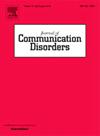单侧声带麻痹的医疗保健经验:一项病人视角的定性研究。
IF 2.1
3区 医学
Q2 AUDIOLOGY & SPEECH-LANGUAGE PATHOLOGY
引用次数: 0
摘要
目的:单侧声带麻痹(UVFP)经常引起严重的发声障碍,需要多学科治疗。关于干预结果的文献主要集中在声带运动或器乐声乐结果上,但尚未调查患者对治疗过程的看法。因此,本研究的目的是探讨UVFP患者在医疗保健方面的经验。方法:24例成人UVFP患者(年龄39 ~ 84岁)参与研究。采用NVivo软件程序进行半结构化访谈,并进行转录和分析。采用归纳主题方法对访谈进行编码和分析。结果:通过定性分析确定了三个主题:(1)卫生保健专业人员(HCP),(2)治疗经验,(3)患者支持。喉科医生和语言病理学家(SLP)是治疗过程中至关重要的hcp,患者非常依赖他们的建议,因此他们希望他们了解UVFP并对患者感同身受。由于与SLP的合作治疗关系,语音治疗主要是一种积极的体验,即使它没有产生足够的语音改善。对一些参与者来说,媒介化手术是一种解脱,而另一些人则期望更多,或者觉得自己太脆弱,无法接受手术。患者支持的来源包括个人关系,如亲属和其他患者,但与会者表示需要医疗保健系统提供更多支持和指导。结论:总体而言,参与者对他们所接受的护理感到满意,但确定了UVFP医疗保健中的某些障碍和需求。当前研究的结果可以帮助指导倡议的发展,以更好地支持患者和HCPs,并改善以患者为中心的UVFP护理。本文章由计算机程序翻译,如有差异,请以英文原文为准。
Experiences with healthcare for unilateral vocal fold paralysis: A qualitative study of the patient's perspective
Objective
Unilateral vocal fold paralysis (UVFP) frequently causes severe dysphonia, which necessitates multidisciplinary treatment. Literature on outcomes of interventions has primarily focused on vocal fold motility or instrumental vocal outcomes, but the perspectives of patients about the treatment process have not yet been investigated. The purpose of the study was therefore to explore patient experiences with healthcare for UVFP.
Methods
Twenty-four adults with UVFP (age range: 39 – 84 years) participated in the study. Semi-structured interviews were conducted, transcribed, and analyzed with the software program NVivo. An inductive thematic approach was used to code and analyze the interviews.
Results
Three themes were identified through the qualitative analyses: (1) the healthcare professional (HCP), (2) experiences with treatment, and (3) patient support. The laryngologist and speech-language pathologist (SLP) were crucial HCPs during treatment, and patients relied heavily on their advice, so they expected them to be knowledgeable about UVFP and empathic towards their patients. Voice therapy was mostly a positive experience due to the collaborative therapeutic relationship with the SLP, even though it did not yield sufficient voice improvements. Medialization surgery was a relief for some participants, while others expected more or felt too vulnerable to undergo surgery. Sources of patient support included personal connections such as relatives and fellow patients, but participants expressed a need for increased support and guidance from the healthcare system.
Conclusion
Overall, participants were satisfied with the care that they had received, but certain barriers and needs within UVFP healthcare were identified. The findings from the current study can help guide the development of initiatives to better support patients and HCPs and improve patient-centered care in UVFP.
求助全文
通过发布文献求助,成功后即可免费获取论文全文。
去求助
来源期刊

Journal of Communication Disorders
AUDIOLOGY & SPEECH-LANGUAGE PATHOLOGY-REHABILITATION
CiteScore
3.30
自引率
5.90%
发文量
71
审稿时长
>12 weeks
期刊介绍:
The Journal of Communication Disorders publishes original articles on topics related to disorders of speech, language and hearing. Authors are encouraged to submit reports of experimental or descriptive investigations (research articles), review articles, tutorials or discussion papers, or letters to the editor ("short communications"). Please note that we do not accept case studies unless they conform to the principles of single-subject experimental design. Special issues are published periodically on timely and clinically relevant topics.
 求助内容:
求助内容: 应助结果提醒方式:
应助结果提醒方式:


